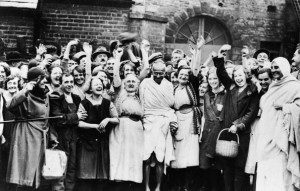February 3
 “Wherever there are jars, wherever you are confronted with an opponent, conquer him in love.”
“Wherever there are jars, wherever you are confronted with an opponent, conquer him in love.”
—Gandhi (The Nation’s Voice, Part II, pp. 109-110)
In 1931, Gandhi found himself in England for the First Roundtable Conference on Indian freedom. The campaign he was leading back in India based on the revival of the spinning wheel and economic independence from British exploitation of India’s textile industry was making its impact felt in the mills of England, with more and more people losing their livelihood. Many were very angry.
While the talks were stalling, Gandhi was invited to the mill town of Darwen, in Lancashire, by the Davies family who were not only mill-owners, but Quakers and Socialists. They hoped that seeing the people of Lancashire would persuade him to change his views about his campaign to boycott British cloth. Knowing full well that he was likely to meet with hostility, he accepted the invitation — characteristically.
Gandhi spoke to the mill workers, and shared that his sympathies were with them, but insisted that he would not end the boycott until India was independent. “You have three million unemployed, but we have three hundred million, for half the year” he explained, and while he did not begrudge their comparative happiness he warned, “don’t attribute your misery to India. Think of the world forces that are powerfully working against you.”
By the end of his talk they were no longer his opponents. He had conquered them with his love—his love of them, of justice, his belief in the cause, and his gentle fearlessness. The town was cheering for him (see photo above!). One woman who was 10 years old at the time remembers that her father told her to go and meet him, “so in the future she could say that she had met this brave man.”
Experiment in nonviolence:
Start small (we are not Gandhis). Pick someone with whom you have had a bit of a disagreement. Rethink the problem from their point of view, sympathize: we’re on our way to learning conquest by love.








